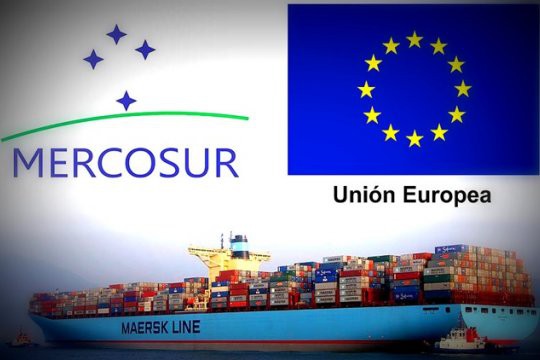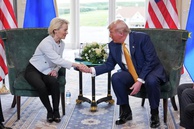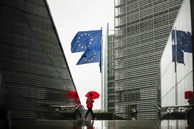To begin, here is a quote: “The European Union and MERCOSUR reached a political agreement today on an ambitious, balanced and comprehensive trade agreement… The EU is the first major partner to conclude a trade pact with MERCOSUR, a bloc comprising Argentina, Brazil, Paraguay and Uruguay. The agreement signed will cover a population of 780 million people and strengthen the close political and economic relations between the EU and MERCOSUR countries.” This message appeared on the website of the European Commission… on June 28, 2019. On that same day in Brussels, the then President of the European Commission, Jean-Claude Juncker, solemnly declared: “I am carefully weighing my words when I say that this is a historic moment… Thanks to this trade pact, MERCOSUR countries have decided to open their markets to the EU. This is undoubtedly great news for companies, workers and the economy on both sides of the Atlantic, which will save more than €4 billion in duties per year. This is the largest trade agreement the EU has ever concluded.”
Alas, as it turned out, Mr. Juncker was too hasty, and the champagne was opened too soon. It is the end of 2024, and there is still no real EU-MERCOSUR agreement. The 2019 version of the document, which the parties had worked towards long and hard, got bogged down in the final legal and environmental expertise, revisions, countless reviews from EU members, new requirements for the Latin American side, and was never submitted for final approval to the European Parliament (EP). Moreover, it produced powerful opponents and generated a host of contradictions within the "European house," if not outright conflict, with France and Germany as the main actors.
The MERCOSUR community was founded on November 29, 1991, by leading South American states in order to coordinate economic policy and gradually create a common trade market, harmonize legal regulation, and jointly protect the environment. The Latin Americans then took the European experience as a model for the "Common Market of the South" (the translation of Mercado Común del Sur, hidden behind the usual abbreviation). In particular, they adopted the abolition of tariffs in trade between member states of the association and the introduction of a common external tariff and a common trade policy with third countries, as well as the free movement of goods, services, capital, and labor, based on the model of the European Union.
In addition to the founding countries – Argentina, Brazil, Paraguay, and Uruguay – Chile, Peru, Colombia, Ecuador, Guyana, and Suriname participate in MERCOSUR's work as associate members without voting rights. Bolivia joined the community in the summer. Venezuela officially joined the union as a fifth member in 2012 but was suspended in 2016. Currently, MERCOSUR member states are home to about 62 percent of South America's population and produce 67 percent of the continent's GDP.
The agreement between MERCOSUR and the EU should create the world's largest free trade area. According to the European Commission's calculations, trade volumes should increase by 10 to 30 percent. And now, the fate of almost 25 years of negotiations between the parties towards this goal seems to be approaching a decisive moment. Ursula von der Leyen, newly confirmed as President of the EP, is determined to see the matter through and finally give the considerably stalled agreement the green light. Negotiations are expected to come to a close by mid-December to consider their results at the EU Council meeting on December 18-20. It's no longer expedient for Brussels to back down, as the dream day has been postponed more than once: it was previously planned to vote on it on December 10, if the agreement could be concluded during the MERCOSUR summit in Montevideo on December 5-7, and before that, there were even talks about signing the document during the G20 summit in Rio de Janeiro, which was enthusiastically supported by the host of the meeting, Brazilian President Luiz Inácio Lula da Silva. He even announced that he would put the drinks on ice in Rio: “We are ready to sign the agreement. And if the EU is ready now, we can sign the agreement during the G20 or at any other meeting with the European Union – with champagne.” But it didn't happen, primarily, because of the desperate diplomatic activity of Emmanuel Macron, who became the main brake on the EU's rapprochement with the "Common Market of the South."
The French president still hopes to prevent Brussels from concluding an agreement with MERCOSUR, which is fraught with another series of extremely sensitive problems in his own country, which is already experiencing turbulent times. Macron is under intense pressure from French farmers and the agricultural industry, for whom MERCOSUR has become a symbol of an existential threat. Farmers are very much afraid that with the creation of a common free trade market, a flood of cheap food and other agricultural products will pour into Europe from MERCOSUR countries, which local producers will hardly be able to compete with, leading to the ruin and bankruptcy of many farms. Farmers demanded that the president and government say a resolute French "no" to the agreement with the Latin Americans and, as a warning, once again filled the streets and squares of Paris and several other cities with columns of tractors carrying protest slogans. And, as is known, the local farmers are not lacking in readiness for decisive action – they have proved it more than once, sometimes even with "manure at hand."
Rejection of the agreement with MERCOSUR is spreading throughout French political circles and is finding understanding among the public. Reuters recently quoted the opinion of France's new Minister of Agriculture, Anne Genevard, who described the EU-prepared agreement with the South American states as a "bad agreement" because it would allow the import of "99,000 tons of beef, 180,000 tons of sugar, and a similar amount of poultry," which would create harmful competition for national producers. Illustrating the intensity of political passions, POLITICO cites the following fact: On November 12, more than 600 French lawmakers signed and published a letter in Le Monde calling for the agreement to be canceled. Prime Minister Michel Barnier went to Brussels the very next day to meet with Ursula von der Leyen, and after talking with her, criticized the deal before reporters, dejectedly calling it "catastrophic." The head of the European Commission told Barnier that she could only make a statement on France's position at the MERCOSUR summit in early December, to which he allegedly replied that France could "explode" if the deal was clinched and called for a postponement.
Nevertheless, Brussels continues to convince the French that there is no cause for concern and points to the potential benefits of the trade agreement, such as opening new markets for French winemakers, cheese producers, and dairy products. The French agricultural sector could benefit from the deal with MERCOSUR, the European Commission insists. The determination of Brussels regarding the agreement with the Latin American countries is also confirmed by the new head of European diplomacy, Kaja Kallas. Let us recall that during the "casting" of European Commissioners, Kallas also motivated the necessity of this agreement by the intensification of competition for regional markets with Beijing. Kallas said: "If we don't conclude a trade agreement with them, this gap will indeed be filled by China," adding that between 2020 and 2022, Chinese investment in Latin America increased 34-fold.
Meanwhile, Macron, understanding the resolute mood in Brussels, continues to make efforts to postpone the conclusion of the agreement and obtain as many concessions as possible for Paris. French arguments are based, in particular, on the demand for penalties and other measures that will force agricultural producers from MERCOSUR to comply with EU production standards. Macron tried to convey this to his interlocutors during his seven-day tour of Latin America, where he met with the presidents of Brazil and Argentina. Both countries are major beef producers, whose exports are seen by French beef producers as a threat. In addition to demanding that MERCOSUR comply with EU production standards, France also decided to rely more on the norms of the 2015 Paris Agreement on Climate Change. It wants any violation by MERCOSUR of its commitments under the Paris Agreement to be punishable by sanctions, such as suspending the deal. The climate agreement is a significant element of the common market being created and compliance with mandatory requirements against deforestation of South American and other forests is now also among the main points of negotiations for Brussels in the final stage. Meanwhile, some MERCOSUR participants believe that the EU's environmental requirements are excessive and only benefit Europeans. For example, Argentine livestock farming is much more environmentally friendly than European livestock farming. In addition, the carbon footprint of MERCOSUR countries in agricultural products is one of the lowest in the world. The EU's additional protocol, which aims to set stricter environmental standards for the MERCOSUR agreement, has not been met with much enthusiasm in Brazil. As Lula da Silva noted, "the basis of relations between strategic partners should be mutual trust, not mistrust and sanctions."
Naturally, it is not only French farmers who are afraid of the agreement with MERCOSUR. Therefore, Macron is actively seeking other allies, trying to form a blocking minority against the deal. According to EU rules, to block the signing of the document, he needs at least four states that also do not want to participate in this union. According to leaks from the Elysée Palace, the French are conducting close negotiations with Poland, Austria, and Italy, which are critical of MERCOSUR. The Poles have already responded. Citing concerns about the plight of farmers and food security in their country, Polish Prime Minister Donald Tusk stated that his government would not accept the MERCOSUR agreement in its current form and is joining France's position. In Warsaw, there are fears that the deal could hit Polish poultry and beef producers, sugar and ethanol producers the hardest. At a meeting on November 26, the Polish government adopted a resolution against the EU-MERCOSUR agreement. Paris reacted with enthusiasm. "The fact that Poland voted against MERCOSUR is fantastic news," Anne Genevard declared from the rostrum of the National Assembly and called for giving Brussels "a final warning." "Given the prospect of ratifying this agreement, we must send a clear signal to our partners: do not throw a match into a powder keg," the minister threatens.
All these maneuvers are viewed with great irritation by Berlin. Germany is the "wings and soul" of the forthcoming agreement with MERCOSUR, where it is awaited with great optimism. Chancellor Olaf Scholz's government has made enormous efforts to advance the document to the final stage and insists on its speedy signing. The export-oriented German industry, which has been floundering in the quagmire of recession for several years, needs new markets for its products and raw material sources, and Latin American countries are seen as promising. This region, in particular, holds half of the world's lithium reserves. Argentina, Chile, and Bolivia are part of the so-called "lithium triangle." Berlin sees the upcoming agreement as an important opportunity to strengthen the German industrial base, especially the automotive sector. Daimler and Volkswagen, as well as chemical giants BASF and Bayer, have already expressed their interest. Germany also proceeds from the fact that the economies of the Latin American region are showing a tendency to grow. The International Monetary Fund (IMF) and the World Bank are noting that inflation in the region is declining in almost all countries. As a result, interest rates will fall in most of them, and investment will tend to increase. The IMF predicts that by 2025, the region's GDP will increase by 2.7 percent.
As noted by the Federation of German Industries, today only 2.4 percent of German exports go to MERCOSUR countries. In the event of free trade with MERCOSUR, Germany could significantly increase its falling global exports to South America and at the same time reduce its risk exposure when exporting to other markets. If the EU-MERCOSUR agreement were concluded, it would, according to Volker Treier, head of the foreign trade department of the German Chamber of Commerce and Industry (DIHK), "absolutely change the rules of the game and be an important ray of hope for our exports."
So will Brussels be able to pull the long-awaited agreement out of the dive of contradictions and confrontations? Optimistic expectations on this account certainly prevail, but these are expectations of very cautious optimism. The agreement has become too heavy an apple of discord within the EU. The months-long tug-of-war between political players has called into question the efficiency and reliability of European decision-making processes in trade policy. Analysts note that the international authority and reliability of the European Union in the MERCOSUR story have been seriously undermined. And in general, negotiations on free trade agreements in the EU in recent years are increasingly turning into political squabbles. Suffice it to recall the past disputes over the failed free trade agreement between the EU and the US, which in the coming era of Donald Trump is perceived as completely surreal. As for the current protests of European farmers, their potential is clearly transforming from the economic to the political sphere, which the political elite of the EU may soon feel.
read more in our Telegram-channel https://t.me/The_International_Affairs

 11:49 05.12.2024 •
11:49 05.12.2024 •



























